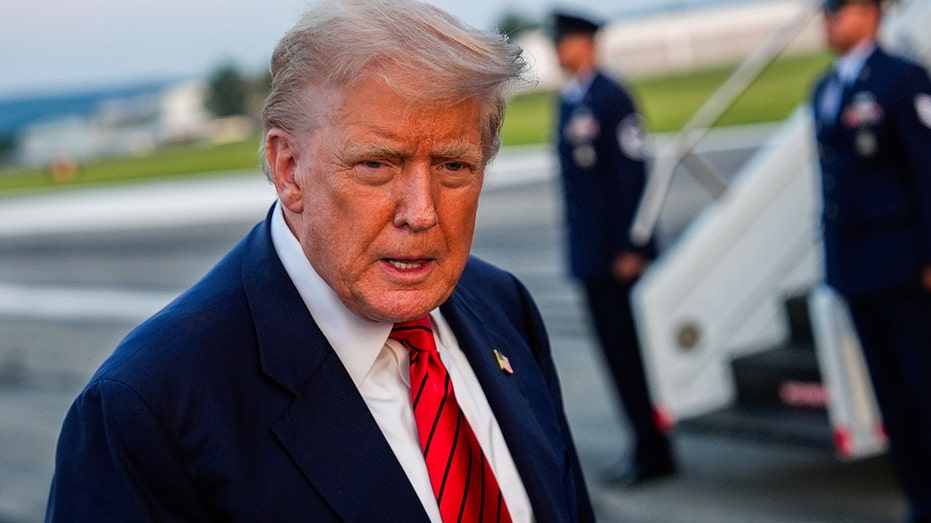
WWW.FOXNEWS.COM
Trump confirms 2 nuclear submarines are 'in the region' to counter Russia
President Donald Trump told reporters on Sunday that nuclear submarines he ordered to counter Russia are now "in the region" ahead of U.S. special envoy Steve Witkoffs visit.Before boarding Air Force One in Allentown, Pa., to return to Washington, D.C., Trump was asked if the nuclear submarines had already been deployed to "face Russia." Trump said on TRUTH Social on Friday that he ordered two nuclear submarines "to be positioned in the appropriate regions" in response to what he considered "highly provocative statements" from former Russian president Dmitry Medvedev about potential war with the U.S."I've already put out a statement and the answer is they are in the region, yeah, where they have to be," Trump told reporters at Lehigh Valley International Airport on Sunday.Trump said that Witkoff is expected to travel to Russia on "Wednesday or Thursday." Russian state media reported Monday that Witkoff would arrive on Wednesday. The visit comes ahead of the Friday deadline Trump set for Russian President Vladimir Putin to reach a ceasefire agreement with Ukraine or face additional sanctions and tariffs. Trump also has warned about potential secondary tariffs for the purchasers of Russian energy.TRUMP BRUSHES BACK RUSSIA'S MEDVEDEV AFTER 'WAR' WARNING: 'WATCH HIS WORDS'"Well, there'll be sanctions, but they seem to be pretty good at avoiding sanctions. You know, they're wily characters, and they're pretty good at avoiding sanctions," Trump told reporters in front of Marine One. "So we'll see what happens."Asked about Witkoffs message to Moscow and if theres anything the Russians can do to avoid sanctions, Trump said Sunday, "Yeah, get a deal where people stop getting killed.""A tremendous number of Russian soldiers have been killed. And likewise Ukraine, a lower number, but still thousands and thousands of people. And now we're adding towns where they're being hit by missiles. So it's a lot of people being killed in that ridiculous war," Trump said. "We stopped a lot of countries from war, India and Pakistan, we stopped a lot of countries. And we're going to get that one stopped too. Somehow. We're going to get that one stopped. That's a really horrible war.""This should be the easiest to stop, and its not," Trump added.Before ordering the deployment of nuclear submarines last week, Trump had warned Medvedev, the deputy chairman of Russia's Security Council, to "watch his words." Medvedev had complained that Trump had shortened the Russia-Ukraine ceasefire deadline from 50 days to just 10 to 12 days, saying that the "ultimatum" was threat toward war "not between Russia and Ukraine, but with his own country."Despite Trump cautioning that Medvedev was entering "dangerous territory," the Russian official doubled down and referenced Russias "Dead Hand" the Cold War-era automated nuclear retaliation system developed by the Soviet Union.The U.S. and Russia hold the largest nuclear arsenals in the world.Top Kremlin spokesman Dmitry Peskov reportedly downplayed the U.S. deployment of nuclear submarines Monday. He told reporters that "American submarines are already on combat duty thats a constant process" and the Russians "dont believe this is a case of any sort of escalation," according to the Russian-language news website Meduza.Asked about Medvedev's remarks, Peskov said members of the leadership in any country have different views but stressed Putin definitively decides Russian foreign policy."We approach any statements related to nuclear issues with great caution," Peskov added at the press conference, according to The Moscow Times. "Russia is firmly committed to nuclear non-proliferation, and we believe that all parties should exercise the utmost restraint when it comes to nuclear rhetoric."TRUMP ANNOUNCES 25% TARIFF ON INDIA, SLAMMING 'OBNOXIOUS' TRADE BARRIERS, RUSSIA MILITARY AND ENERGY BUYSMeanwhile, Beijing and Moscow have deepened their ties in recent years, with China providing an economic lifeline to Russia in the face of Western sanctions over the 2022 invasion of Ukraine.Russia and China have started mock combat drills and other war games in the Sea of Japan, The Telegraph reported. Citing a statement from the Chinese Defense Ministry, the newspaper said the three-day exercise involves four Chinese vessels, including the guided-missile destroyers Shaoxing and Urumqi, and entails "submarine rescue, joint anti-submarine, air defense and anti-missile operations, and maritime combat," as well as naval patrols in "relevant waters of the Pacific."At a press conference announcing details of the annual drills last week, Chinese Defense Ministry spokesperson Zhang Xiaogang said the Joint Sea 2025 exercise would be held in the air and seas near the Russian port city of Vladivostok, positioned across the sea from Japan's west coast. Last year, the drill was held off southern China in the South China Sea."This is an arrangement within the annual cooperation plan between the Chinese and Russian militaries. It is not targeted at any third party, nor is it related to the current international and regional situation," Zhang said.China and Russia also signed a "no-limits" economic partnership shortly after the war in Ukraine began.Zhang criticized ongoing drills that the U.S. Air Force is conducting with Japan and other partners in the western Pacific. Resolute Force Pacific is the largest contingency-response exercise ever conducted by the Air Force in the region, according to the U.S. military. The U.S. Air Force has said their exercise will train its forces to maintain readiness and execute missions under stress to demonstrate their ability to defend the United States and partner nations in the Pacific."The U.S. has been blindly flexing muscles in the Asia-Pacific region and attempting to use military drills as a pretext to gang up, intimidate and pressure other countries, and undermine peace and stability in the region," Zhang told reporters.Japan's Defense Ministry said in an annual report earlier this month that Chinas growing military cooperation with Russia poses serious security concerns.The Associated Press contributed to this report.
0 Kommentare
0 Geteilt
12 Ansichten
0 Bewertungen



